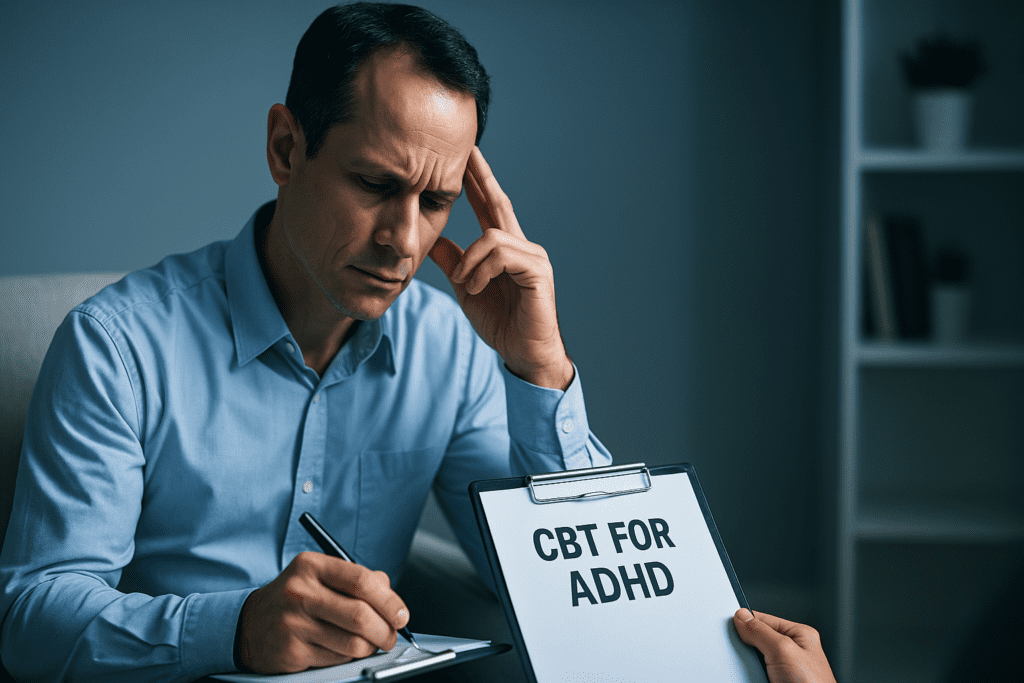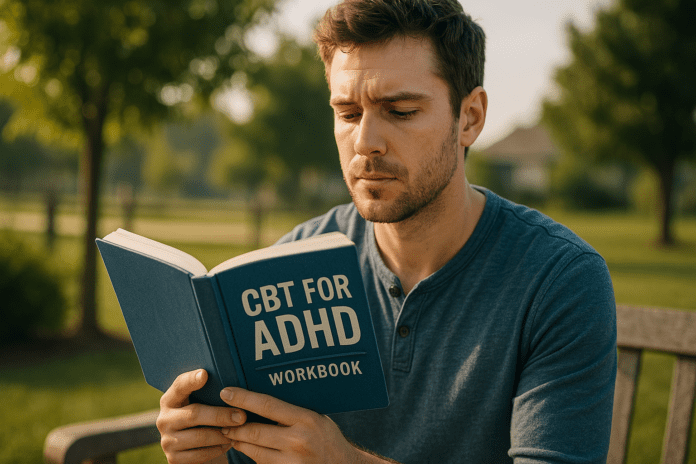In the modern mental health landscape, cognitive behavioral therapy (CBT) has emerged as one of the most evidence-based, effective, and accessible forms of psychotherapy. While originally developed to treat depression and anxiety, CBT has steadily expanded its reach into many other areas of psychological distress. One area in which it is increasingly recognized as particularly valuable is in the treatment of Attention-Deficit/Hyperactivity Disorder (ADHD). Although medication remains the frontline treatment for many, cognitive behavioral therapy for ADHD offers a science-backed, non-pharmacological approach that targets the cognitive and behavioral challenges associated with the disorder. For many individuals, combining CBT with medication yields the most comprehensive and lasting results.
You may also like: How Does CBT Work to Improve Relationships and Communication? Science-Backed Techniques for Getting Along with Others
Understanding ADHD Through a Cognitive-Behavioral Lens
ADHD is more than just distractibility or impulsivity; it is a neurodevelopmental disorder that affects multiple aspects of a person’s cognitive functioning and self-regulation. From time blindness to emotional dysregulation, the symptoms of ADHD often manifest in ways that profoundly disrupt daily life. Traditional interventions, particularly stimulant medications, address the neurochemical imbalances associated with ADHD. However, they do not necessarily equip individuals with the tools to manage daily struggles in organization, planning, or emotional regulation. This is where ADHD cognitive therapy, especially when based on CBT principles, fills a critical gap.
Cognitive behavioral therapy for ADHD approaches the disorder as a pattern of learned cognitive distortions and maladaptive behaviors that can be identified, challenged, and ultimately changed. CBT helps individuals recognize negative thought loops such as “I always fail” or “I’ll never be able to focus,” replacing them with more accurate and constructive alternatives. This shift in thinking lays the groundwork for better emotional control and more adaptive behaviors, leading to improved daily functioning across various domains of life.
Why Traditional CBT Needs Adaptation for ADHD
While CBT has long proven effective in treating depression and anxiety, applying it to ADHD requires thoughtful modification. This is largely because ADHD symptoms such as forgetfulness, disorganization, and impulsivity can hinder the cognitive demands of standard CBT. For example, an adult with ADHD may struggle to complete homework assignments or track their progress from session to session, which are core elements of conventional CBT practice.
To accommodate these challenges, clinicians who specialize in CBT for attention deficit disorder often use shorter, more structured sessions and emphasize skill-building over introspection. They may also incorporate visual aids, repetition, and technology such as apps or reminders to help reinforce therapeutic goals. In this way, the therapy becomes not only a treatment modality but also a tool for developing the executive functioning skills that individuals with ADHD often lack. These adjustments make CBT more engaging, accessible, and effective for people with ADHD, whether they are children, adolescents, or adults.
Improving Focus and Attention Through CBT
One of the most sought-after benefits of CBT for ADHD is its potential to improve focus and attention. Though these core symptoms are rooted in brain-based differences in executive functioning, they can also be exacerbated by negative thought patterns and unstructured behavior. CBT addresses these contributing factors by helping individuals create specific, measurable goals, establish routines, and identify cognitive barriers to concentration.
For example, a person who frequently procrastinates may uncover a belief such as “If I can’t do it perfectly, I shouldn’t do it at all.” This perfectionistic thinking often leads to avoidance, which in turn worsens focus and increases anxiety. CBT enables clients to recognize this pattern, question its validity, and replace it with a more balanced thought such as “Doing something is better than doing nothing.” By shifting the cognitive framework, individuals are empowered to take action, which enhances their ability to focus over time.
In practical terms, CBT helps clients develop time management skills, break down overwhelming tasks into manageable steps, and implement strategies like the Pomodoro Technique or reward-based systems to sustain attention. These techniques are reinforced through real-life practice and therapist-guided reflection, making the improvements not only visible but lasting.
Enhancing Emotional Regulation With CBT
Emotional dysregulation is an often overlooked but deeply impactful symptom of ADHD. Many individuals with ADHD report feeling emotions more intensely and having difficulty recovering from emotional setbacks. Outbursts, irritability, or chronic frustration are not simply personality traits but are frequently tied to ADHD-related impairments in self-regulation.
CBT for ADHD specifically addresses these issues by teaching emotional awareness and coping strategies. Clients learn to recognize emotional triggers, monitor their physiological responses, and apply self-soothing techniques. More importantly, CBT helps to build the cognitive flexibility needed to reframe emotional experiences. For instance, rather than interpreting a mistake at work as a catastrophic failure, a person learns to view it as a learning opportunity. This shift in interpretation dramatically reduces emotional reactivity and builds resilience over time.
By combining emotional education with cognitive restructuring, CBT offers a robust framework for improving emotional self-control. The therapy often incorporates mindfulness practices and distress tolerance techniques, adapted from dialectical behavior therapy (DBT), to further support individuals in managing intense emotions. These integrative strategies make CBT a comprehensive approach that extends beyond thought correction to include emotional empowerment.

Addressing Daily Functioning and Executive Dysfunction
Daily functioning encompasses everything from getting out of bed on time to paying bills, maintaining relationships, and performing adequately at work or school. For individuals with ADHD, these seemingly simple tasks can become significant hurdles due to deficits in executive function. ADHD cognitive therapy helps bridge the gap between intention and action by targeting these specific areas of struggle.
CBT provides individuals with concrete tools for planning, organizing, and prioritizing. Therapists work with clients to create action plans, implement checklists, and use calendars effectively. By turning abstract goals into tangible steps, CBT reduces the cognitive load associated with decision-making and helps individuals follow through with their intentions. This not only improves productivity but also fosters a greater sense of competence and autonomy.
Importantly, CBT also addresses the emotional toll of executive dysfunction. The chronic stress of underperforming or disappointing others often leads to low self-esteem and demoralization. By helping clients build small, consistent successes, CBT gradually restores self-efficacy and counters the narrative of failure that many individuals with ADHD have internalized. Over time, these changes contribute to more stable daily routines and improved quality of life.
The Role of CBT in ADHD Across the Lifespan
ADHD does not disappear with age, although its manifestations may change over time. Children often exhibit hyperactivity and impulsiveness, whereas adults may struggle more with inattention, disorganization, and emotional instability. CBT for ADHD is uniquely adaptable to meet the developmental needs of different age groups, making it a versatile tool throughout the lifespan.
In children and adolescents, CBT often involves parents or caregivers to reinforce skills outside of therapy sessions. Techniques such as token economies, behavioral contracts, and problem-solving training are commonly used to enhance structure and accountability. For adolescents, CBT can also address emerging identity issues, academic pressures, and social challenges, offering a safe space to build confidence and resilience.
For adults, CBT may focus more on workplace difficulties, relationship dynamics, and long-term goal setting. Many adults with undiagnosed ADHD only seek treatment after experiencing chronic challenges in their careers or personal lives. CBT helps them reframe these experiences not as personal failings but as symptoms of a manageable condition. Through this lens, therapy becomes an empowering journey of self-discovery and skill development.
CBT in Combination With Medication
Although cognitive behavioral therapy for ADHD is effective as a standalone treatment, it often yields the best results when combined with medication. Stimulant medications like methylphenidate or amphetamine-based treatments address the neurological aspects of ADHD by improving neurotransmitter activity in the brain. However, they do not teach coping skills, change thought patterns, or provide emotional insight.
By integrating medication with CBT, individuals benefit from both symptom relief and behavioral transformation. Medication may enhance attention and impulse control, making it easier for individuals to engage in CBT exercises. Conversely, CBT provides the structure and insight needed to sustain improvements once medication effects wear off or if medication is not an option due to side effects or contraindications.
Numerous studies support the efficacy of this combined approach. Research shows that individuals who receive both pharmacological treatment and CBT report greater improvements in attention, emotional regulation, and functional outcomes compared to those who receive either intervention alone. This synergy reinforces the value of CBT not just as an adjunct but as an integral part of comprehensive ADHD treatment.
What the Research and Experts Say
Scientific literature continues to validate the use of CBT for attention deficit disorder, particularly in adults and adolescents. A meta-analysis published in the Journal of the American Academy of Child and Adolescent Psychiatry found that CBT led to significant reductions in core ADHD symptoms, as well as improvements in emotional regulation and executive function. Another study in Cognitive and Behavioral Practice emphasized the long-term benefits of CBT, noting that gains were sustained even after the conclusion of therapy.
Experts in the field echo these findings. Dr. Mary Solanto, a prominent researcher in ADHD treatment, developed a CBT protocol specifically for adults with ADHD that has been widely adopted in clinical settings. She highlights the importance of structured skill-building and personalized goal setting, both of which are central to successful CBT outcomes. Likewise, Dr. Russell Barkley, a leading authority on ADHD, emphasizes that behavioral interventions are essential for addressing the functional impairments associated with the disorder.
These expert perspectives underscore the growing consensus that CBT is not merely a psychological add-on but a foundational element in managing ADHD. As awareness of ADHD continues to rise, especially among adults, the demand for evidence-based, accessible interventions like CBT is likely to grow.

Frequently Asked Questions: CBT for ADHD
1. Can CBT help with time blindness and chronic lateness in people with ADHD?
Yes, cognitive behavioral therapy for ADHD can be particularly helpful in addressing time blindness, a common but under-discussed symptom. Individuals with ADHD often struggle to perceive the passage of time, leading to chronic lateness and missed deadlines. CBT interventions can teach clients how to externalize time through the use of visual timers, alarms, and scheduling tools. Therapists also help individuals develop routines that include time estimation and backward planning to increase punctuality. These behavioral strategies are paired with cognitive reframing to address internal beliefs like “I always run late anyway,” turning them into more constructive self-statements that promote accountability and change.
2. How does CBT for attention deficit disorder influence social relationships?
While often focused on executive functioning, CBT for attention deficit disorder can significantly impact social functioning as well. People with ADHD may experience interpersonal challenges due to impulsivity, poor listening skills, or emotional outbursts. CBT addresses these issues by increasing awareness of social cues, promoting active listening, and practicing delayed responses to reduce impulsivity in conversations. Role-playing and scenario-based exercises within ADHD cognitive therapy sessions provide practical opportunities to rehearse better communication. Over time, these skills can lead to improved friendships, better workplace interactions, and stronger familial relationships.
3. Is CBT effective for adults with ADHD who also have anxiety or depression?
CBT for ADHD is highly adaptable and can be effectively tailored for individuals who have co-occurring conditions like anxiety or depression. In fact, the structured, skills-based nature of CBT makes it especially suited to address overlapping symptoms such as rumination, low self-esteem, and emotional dysregulation. Therapists can integrate elements of traditional CBT aimed at mood disorders while also focusing on ADHD-specific strategies like task initiation and focus training. By treating the cognitive distortions common in both ADHD and mood disorders, therapy becomes more holistic and efficient. Many clients report reduced emotional overwhelm and increased self-mastery when CBT is adapted to meet these complex clinical profiles.
4. Can cognitive behavioral therapy for ADHD help with sleep issues and nighttime restlessness?
Many people with ADHD experience difficulties with sleep initiation and maintenance, often due to racing thoughts, delayed circadian rhythms, or inconsistent routines. CBT for ADHD can target these problems through the development of structured nighttime habits, the reduction of cognitive overarousal, and the implementation of stimulus control techniques. Therapists often help clients identify unhelpful bedtime thoughts, such as catastrophizing or excessive worry, and replace them with calming self-talk or guided imagery. Behavioral techniques like a consistent wind-down routine, screen time limitations, and progressive muscle relaxation are frequently included. When integrated into a personalized ADHD cognitive therapy plan, these interventions can lead to measurable improvements in sleep quality and next-day functioning.
5. How long does it typically take to see results from CBT for ADHD?
The timeline for seeing results from CBT for ADHD can vary depending on the individual’s specific challenges, co-occurring conditions, and commitment to practice. However, most clients begin to notice measurable improvements within 8 to 12 sessions. Initial gains often include increased awareness of unproductive thought patterns and better organizational skills. As therapy progresses, deeper changes in emotional regulation, task completion, and self-efficacy become more evident. It’s important to recognize that ADHD cognitive therapy is not a quick fix, but rather a process of gradual transformation through consistent practice and reinforcement.
6. Are there specific types of CBT that work best for ADHD?
Several CBT-based approaches have been specifically developed or adapted for ADHD, including the Solanto model for adults and modular CBT programs for children and teens. These specialized forms of CBT incorporate executive function coaching, behavioral activation, and skill rehearsal in addition to traditional cognitive restructuring. While general CBT frameworks can be beneficial, ADHD-tailored protocols offer more practical support for the everyday impairments caused by the disorder. For example, CBT for attention deficit disorder often emphasizes planning, prioritization, and managing overwhelm, areas that are not typically central in standard CBT. Choosing a therapist experienced in ADHD cognitive therapy ensures that interventions are appropriately targeted and effective.
7. How does CBT address motivation problems that are common in ADHD?
A lack of motivation, often misunderstood as laziness, is a frequent concern among individuals with ADHD. Cognitive behavioral therapy for ADHD helps clients understand the neuroscience behind motivational deficits, such as underactive dopamine systems that make task initiation difficult. Therapists guide clients in setting micro-goals that provide quick wins and dopamine boosts, making larger goals feel more attainable. CBT also works to shift internal narratives like “I’m just not motivated” into action-oriented thoughts such as “I can take one small step right now.” This reframing, paired with behavioral activation strategies, helps clients break through inertia and experience success-driven momentum.
8. Can CBT for ADHD be delivered effectively through digital platforms?
Yes, digital CBT platforms have emerged as a promising option for delivering ADHD cognitive therapy, especially for individuals who prefer remote access or have difficulty with in-person appointments. These platforms may include interactive modules, real-time coaching, progress tracking, and digital reminders to help with consistency. While digital CBT should not fully replace face-to-face therapy for those with more complex needs, it can serve as a highly effective supplement or entry point for treatment. Emerging research suggests that digital delivery methods can maintain strong efficacy, particularly when they are rooted in evidence-based CBT frameworks tailored for attention deficit disorder. Accessibility, convenience, and scalability make digital CBT a valuable tool in expanding access to care.
9. How can CBT help manage the long-term risks associated with untreated ADHD?
Left unmanaged, ADHD can contribute to a wide range of long-term risks including academic failure, job instability, financial problems, and relationship breakdowns. CBT for ADHD plays a critical role in mitigating these risks by promoting long-term behavior change and cognitive resilience. By targeting procrastination, poor decision-making, and emotional impulsivity, therapy helps individuals gain more control over their life trajectory. Moreover, CBT enhances self-awareness and coping skills, which are essential for navigating adult responsibilities and life transitions. The lasting benefits of ADHD cognitive therapy extend beyond symptom reduction, fostering healthier habits that build long-term stability and success.
10. What should you look for in a therapist who specializes in CBT for attention deficit disorder?
Finding the right therapist is key to a successful outcome, and not all CBT practitioners have specific expertise in treating ADHD. Ideally, the therapist should have formal training or certification in ADHD treatment and be experienced in adapting cognitive behavioral therapy for ADHD. Look for clinicians who incorporate executive function coaching, structured skill-building, and practical accountability tools into their sessions. It’s also valuable to seek therapists who understand neurodiversity and avoid pathologizing behaviors that may simply reflect a different way of processing the world. A good fit often includes flexibility, a strengths-based approach, and a collaborative therapeutic style that empowers the individual.

Final Thoughts: Why CBT for ADHD Deserves a Central Role in Treatment
In an era where mental health is finally receiving the attention it deserves, it is essential to embrace therapies that offer both scientific credibility and practical benefits. CBT for ADHD stands out as a treatment that addresses not only the symptoms but also the underlying cognitive and emotional patterns that contribute to daily dysfunction. It empowers individuals to understand themselves better, manage their emotions more effectively, and navigate the demands of everyday life with greater confidence and clarity.
Whether used alone or in combination with medication, cognitive behavioral therapy for ADHD delivers measurable, lasting improvements in focus, emotional regulation, and executive functioning. It is adaptable across age groups, applicable in various settings, and backed by a solid body of scientific research. As the field of mental health continues to evolve, incorporating ADHD cognitive therapy into mainstream treatment protocols will not only improve outcomes but also provide hope and empowerment for millions of individuals worldwide.
For those seeking a non-pharmacological alternative or a complementary approach to medication, CBT for attention deficit disorder offers a structured, supportive, and scientifically grounded path forward. As more clinicians become trained in these methods and more individuals gain access to them, the potential for meaningful, life-enhancing change will only continue to grow.
executive function strategies, adult adhd therapy, behavioral therapy for focus, emotional regulation techniques, non-medication adhd treatment, adhd time management tools, therapy for impulsivity, managing distractibility, adhd in adults and teens, focus improvement techniques, emotional self-control training, therapist-led adhd coaching, attention enhancement therapy, neurodiversity affirming care, therapy for procrastination, digital adhd therapy programs, therapy for disorganization, mental health support for adhd, coping skills for adhd, psychological interventions for attention issues
Further Reading:
How Cognitive Behavioral Therapy Can Help Manage ADHD
Experience of CBT in adults with ADHD
How CBT Dismantles ADHD Negativity
Disclaimer
The information contained in this article is provided for general informational purposes only and is not intended to serve as medical, legal, or professional advice. While Health11News strives to present accurate, up-to-date, and reliable content, no warranty or guarantee, expressed or implied, is made regarding the completeness, accuracy, or adequacy of the information provided. Readers are strongly advised to seek the guidance of a qualified healthcare provider or other relevant professionals before acting on any information contained in this article. Health11News, its authors, editors, and contributors expressly disclaim any liability for any damages, losses, or consequences arising directly or indirectly from the use, interpretation, or reliance on any information presented herein. The views and opinions expressed in this article are those of the author(s) and do not necessarily reflect the official policies or positions of Health11News.


